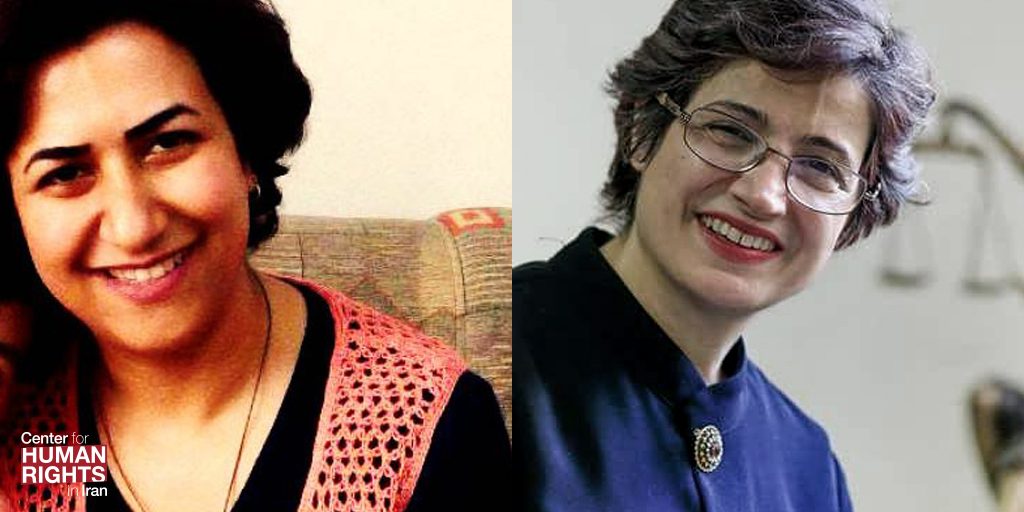Nasrin Sotoudeh and Baha’i Political Prisoner Refuse Phone Calls in Solidarity with Nazanin Zaghari-Ratcliffe

JANUARY
11, 2019
Two political prisoners held in
the same ward as Nazanin Zaghari-Ratcliffe in Iran’s Evin Prison have given up
their right to phone calls until the authorities lift newly imposed
restrictions targeting the Iranian UK dual national as well her fellow inmates
in the Women’s Ward.
Zaghari-Ratcliffe’s weekly
phone calls with her husband were canceled and her food rations decreased after
she announced she would be going on hunger strike for access to medical treatment for lumps in her breast.
This prompted prominent human rights lawyer Nasrin
Sotoudeh and Baha’i university educator Azita
Rafizadeh to give up their own phone calls in
solidarity with Zaghari-Ratcliffe.
Until recently, female inmates
held in the Women’s Ward of Evin Prison in Tehran were allowed to make three
20-minute phone calls per week. Now, female prisoners can only make 10-minute
phone calls according to a schedule set by the authorities, a knowledgeable
source told the Center for Human Rights in Iran (CHRI).
In the wards where male
prisoners are held, inmates have phone access every day from eight in the
morning until nine in the evening, added the source who spoke on the condition
of anonymity.
According to testimonies provided by former political prisoners held in Evin Prison’s
Women’s Ward, inmates there endure inhumane conditions, including the denial of
proper medical care in a prison infirmary that is dirty and lacking in supplies
and medical specialists, denied or delayed transfer to hospital and specialists
for treatment of serious illnesses, inadequate nutrition, and intermittent lack
of heat.
Like all political prisoners in
Iran, these women are subjected to harsher treatment than other inmates. They
are routinely denied or subjected to limited family visits and telephone
communication with family, and they are denied or subjected to limited
furloughs, or temporarily leave, granted to most prison inmates in the Iranian
penal system.
The behavior consistently cited
by the inmates as the most distressing of all was the denial or limitation of
visits and telephone communications with family. This is in keeping with the
Islamic Republic’s punitive treatment of political prisoners throughout the
country’s prisons.
As a number of the prisoners of
the Women’s Ward are mothers, including Zaghari-Ratcliffe, Rafizadeh and
Sotoudeh, the lack of phone access is particularly painful given the unique
bond between mother and child.
Zaghari-Ratcliffe’s daughter is
now four-years-old; having spent more than half her life in Tehran being raised
by her grandparents (Zaghari-Ratcliffe’s parents) after the authorities
imprisoned Zaghari-Ratcliffe under a five-year prison sentence under
unspecified espionage charges.
Sotoudeh has an 18-year-old
daughter and a 12-year-old son. Rafizadeh has a nine-year-old son and her
husband, Payman
Koushk-Baghi, is also incarcerated.
Since October 2015, Rafizadeh
and Koushk-Baghi have been behind bars serving five-year prison sentences
for teaching at the Institute for
Higher Education (BIHE), which provided
university-level education for members of the Baha’i faith who are routinely
denied university educations in Iran because of their religious beliefs.
Sotoudeh, an outspoken human
rights defender and lawyer, is also currently serving a five-year
prison sentence while facing several other charges primarily for being the attorney of a woman who was charged
for removing her compulsory headscarf in public in Iran.
On January 8, 2018, Iranian
state-run TV aired a
sensationalist film posing as a documentary alleging
that Zaghari-Ratcliffe was an agent of the US and UK who was plotting to bring
down the Islamic Republic.
No comments:
Post a Comment